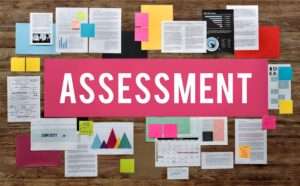Skill-based assessment test are essential for making sure workers have the qualities employers need. These assessments help determine if workers can cooperate in teams, solve problems, and make good decisions. Some tests focus on specific skills, such as operating machinery or using computers.
Companies find these tests useful for improving and training their employees. They show how employees get better over time.

In today’s world, technology like artificial intelligence (AI) is changing how we assess skills. AI-powered tests are used in schools and businesses. But how do these new tests work? How are they changing the old methods? And what are the advantages and disadvantages? These are the things we’re going to discuss.
Finding 1: Redefining Skill Assessment
At the heart of any skill-based assessment lies the ability to gauge an individual’s competencies accurately. The AI-based technical test assessment tool stands out by providing an innovative and efficient method of doing this. Unlike conventional testing methods that often present a one-size-fits-all approach, AI-based testing systems are designed to adapt to the test-taker’s knowledge level. The AI algorithms analyze responses in real-time, adjusting the difficulty level and complexity of subsequent questions to match the abilities of the individual.
This shift from a standard testing model to a dynamic and adaptive one allows for a more individualized and in-depth understanding of a candidate’s strengths and weaknesses. It’s a revolution that not only leads to a more accurate reflection of one’s capabilities but also transforms the way learning and development is perceived and executed.
Finding 2: The Unprecedented Benefits
The most significant advantage of AI-based skill assessment tools is their remarkable efficiency and accuracy. These intelligent systems reduce administrative work by automating the grading process, thereby delivering fast, unbiased, and precise results. They also curtail the chances of human error, thus maintaining a high degree of consistency and reliability.
Further, AI-powered assessments provide a data-driven approach to skill evaluation. They gather, analyze, and interpret vast amounts of data related to a candidate’s performance, enabling organizations to make informed decisions. The ability to draw insights from patterns and correlations in data sets can significantly help in predicting future performance and identifying skill gaps.
Another profound benefit is the potential for AI to combat biases in assessments. By minimizing human involvement in the evaluation process, AI can help reduce conscious and unconscious biases, leading to a fairer assessment of candidates’ abilities.
Finding 3: Acknowledging the Challenges
Despite the numerous benefits, AI-based assessment tools are not without their challenges. These mainly pertain to data privacy concerns and the risk of over-reliance on technology.
Data privacy is a significant issue in the age of digital information. The vast amount of personal data collected, stored, and analyzed by AI systems can lead to concerns over data misuse and security breaches. Thus, it’s vital for organizations using AI-based testing tools to adhere to stringent data protection regulations.
The risk of over-reliance on AI and the resultant loss of human touch in assessments is another challenge. AI, while impressive, lacks human intuition and empathy. There’s a danger that an over-dependence on technology could lead to ignoring important human elements like creativity and emotional intelligence, which are difficult for AI to assess.
Looking Forward: Future Developments
Looking ahead, the future of AI-based technical test assessment tools seems to be filled with endless possibilities. We envision AI evolving from being just a testing tool to becoming a sophisticated digital coach. This progression will allow the systems not just to assess, but also guide learners based on their individual strengths, weaknesses, and learning styles.
Moreover, the integration of advanced technologies like natural language processing and machine learning can further augment the capabilities of these AI tools. They could potentially offer more sophisticated methods of evaluating skills, such as real-time assessment of spoken language proficiency or gauging a candidate’s problem-solving abilities during a live coding session.
Comparing Skill Evaluation Tests with Other Assessment Techniques / The Contrast Between Skill Tests and Interview Methods
Skill evaluation tests and interviews are two common techniques used by employers for assessing potential candidates. Each method has its own strengths and weaknesses, and they often complement each other when used together.

Skill Evaluation Tests:
Skill evaluation tests, also known as competency or ability tests, are designed to objectively measure a candidate’s ability to perform tasks related to a specific job. They can be as simple as basic math tests for cashier positions, or more complex, like coding tasks for software developer roles.
Objectivity: Skill tests provide a standardized measurement of a candidate’s abilities. This reduces the influence of subjective biases, offering a more fair and accurate representation of a candidate’s capability.
Quantifiable results: The results are usually quantifiable, making it easy to compare different candidates.
Practicality: They offer a practical demonstration of a candidate’s abilities. For instance, a writing test would directly reflect a candidate’s writing skills.
However, these tests do have limitations:
Limited scope: Skill tests typically focus on a specific set of skills, meaning they may not cover all the competencies required for a role.
Stress: Test conditions can cause stress, which may impact performance and not accurately reflect a candidate’s abilities in a normal working environment.
Time and resources: Developing, administering, and scoring tests can be time-consuming and resource-intensive.
Interview Methods:
Interviews are a more subjective method of assessing candidates. They involve one-on-one or panel discussions, usually centered around a candidate’s experience, behavior, or hypothetical scenarios.
Personality assessment: Interviews allow employers to assess a candidate’s personality, communication skills, and cultural fit, which are difficult to evaluate through tests.
Flexibility: Interviews can be tailored to each candidate, allowing for a more nuanced evaluation of their abilities and fit.
Understanding motivations: Interviews provide insights into a candidate’s motivations, aspirations, and their reasons for applying.
However, interviews also have downsides:
Subjectivity: Interviews can be influenced by unconscious biases, leading to potentially unfair or inaccurate evaluations.
Preparation: Some candidates might perform well in an interview due to rigorous preparation, but might not necessarily perform well on the job.
Time-consuming: Interviews are time-consuming for both the interviewer and the candidate.
What are the guidelines for selecting the appropriate skill evaluation test? What considerations should employers have when deciding on a skill testing software?
Choosing an appropriate skill evaluation test can be crucial to accurately determine an individual’s abilities and suitability for a job. Here are some guidelines for selecting the appropriate test:
Relevance: The test should be relevant to the job requirements. For instance, if the job involves programming, the test should evaluate relevant programming skills.
Validity: The test should be valid, i.e., it should measure what it is supposed to measure. Tests should be empirically proven to be effective and yield accurate results.
Reliability: The test should be reliable, meaning it should produce consistent results over time. If a person takes the test multiple times, their scores should not vary wildly (assuming their skill level remains constant).
Non-discriminatory: The test should not unfairly disadvantage or favor any group. For example, it should not be biased towards a particular gender, race, or age group.
Legal Compliance: Ensure that the test complies with local, national, and international laws. In the United States, for example, employers must follow the guidelines of the Americans with Disabilities Act (ADA) and the Equal Employment Opportunity Commission (EEOC).
Practicality: The test should be practical and feasible to conduct. It should be easy to administer, score, and interpret.
When deciding on a skill testing software, employers should consider the following:
Ease of Use: The software should be easy to use for both the administrators and the candidates.
Integration Capabilities: It should easily integrate with your existing HR or Applicant Tracking Systems (ATS) to streamline the hiring process.
Customizability: The software should offer customizable tests that can be tailored to your specific needs.
Scalability: The software should be able to accommodate your company’s growth. It should be capable of testing large numbers of candidates if necessary.
Security: The software should have strong security measures in place to protect sensitive data.
Cost-Effectiveness: Consider the cost of the software and whether it’s worth the investment. Keep in mind that a higher price doesn’t necessarily mean better quality.
Reporting and Analytics: The software should provide insightful reports and analytics to help make informed decisions.
Support: Look for software with good customer support that can assist you in case of any technical difficulties or questions.
Test Content: Consider the breadth and depth of the test content available in the software. Is it updated regularly? Does it cover the skills you are interested in assessing?
Remember, no test is perfect, and the results should be used as part of a holistic approach to hiring that includes interviews, references, and other evaluation methods.
Read more about :
How to Test Employee Performance Using the Best Skill Assessment Software
All You Need to Understand Regarding Skill Assessment Examinations
Navigating the Landscape of Skills Assessment: A Comprehensive Guide
Conclusion
The application of artificial intelligence in skill-based assessments is an exciting development, heralding a new era in the realm of education and skill development. While AI-powered tools offer immense benefits, it’s essential to address the associated challenges to harness their full potential.
The journey of AI in skill assessments is just beginning. The transformative power of this technology in redefining skill assessment promises a future where the true potential of individuals can be harnessed to the maximum, all while delivering efficient, accurate, and unbiased results. It’s a future we look forward to with keen anticipation.



